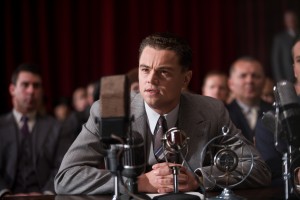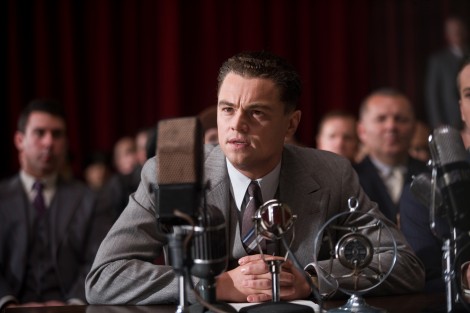A look at ‘J. Edgar,’ both personally and professionally

If for nothing else, Leonardo DiCaprio should be given an Oscar nomination for the amount of prosthetic latex he had to endure to bring famed FBI director J. Edgar Hoover to life. His wrinkles and added chins, all lazily applied to the actor’s boyish face, are unfortunately more dynamic than most of J. Edgar, an overwrought movie that can never sit still and tell its story.
Director Clint Eastwood and screenwriter Dustin Lance Black, both Academy Award winners, can’t decide what to do with Hoover and how to convey his highlights and lowlights. The movie isn’t particularly bad; but given the source material, it falls short as an historical portraiture. Categorize it as a misfire, although one with enough redeeming quality to pique the audience’s interest.
The movie unevenly straddles the line between Hoover, the sexually repressed single man, and Hoover, the modern-day Napoleon. Both storylines feel underdeveloped and not terribly engaging. This is a controversial man responsible for building one of the government’s largest and most influential bureaucracies, compiling secret information on presidents and bigwigs alike, wiretapping any suspected Communist without a shred of evidence and attempting to direct the social waves of American culture. He was billed as the second most powerful man in the United States, a person who had many a politician in his pocket and the public’s protection seemingly as his motive. There’s no doubt the icon was engaging, influential and powerful.
Unfortunately, much of this historical presence is missing from J. Edgar. Or, when it is displayed, it never feels monumental or earth-shattering. The character is reduced to a back-and-forth progression that feels somewhat lost and uneasy. The tempo accelerates and decelerates so many times that it’s difficult to find a centering point, a hook to hang one’s hat and learn a little more about the legendary autocrat.
There is a lot of telling in the movie, but not much storytelling. In snippets and small scenes, we learn about John Dillinger, Eleanor Roosevelt’s suspected lesbian romance, Martin Luther King Jr.’s indiscretions and the organized-crime campaign of the Kennedy administration. J. Edgar name-drops important historical figures and events as a means of including the chapter headings of the 20th century. But upon closer inspection, there’s nothing underneath these references; the movie’s historical aptitude comes off more like a children’s pop-up book than anything else. Look kids, this is when Kennedy was assassinated. Here’s mean old Richard Nixon. What’s that Billy? Oh, well that’s invasion of privacy and lack of reasonable doubt.
The rivalry between Hoover and King, in particular, was formidable. The only connective tissue we’re given is Hoover’s audio file of what’s believed to be an adulterous sexual encounter.
The FBI director makes mention of how fingerprinting criminals will revolutionize the bureau’s efforts, but the plot never follows up on this important development. The kidnapping of Charles Lindbergh’s baby, which firmly placed the FBI and Hoover in the consciousness of the American public, is the only through-line fully explored.
Perhaps the problem is that the movie spends too much time on personal exposition. The relationship between Hoover and his mother (Judi Dench) and Hoover and his adviser/suspected lover (Armie Hammer playing Clyde Tolson) overshadow any and all mentions of Sen. Joseph McCarthy, HUAC and every American president from Coolidge to Nixon. Robert Kennedy (Jeffrey Donovan) is perhaps the only person to get more than a glancing reference.
This is not to say that Hoover’s personal life shouldn’t have been a vital component of the biography. Knowing where he came from and what might have driven some of his decisions over the years is important and sets the character in a more humanistic tone. Black, who won an Oscar for writing Milk, does an admirable job with the construction of Hoover’s hard exterior. The FBI director focused on shined shoes, perfectly styled haircuts, proper suits and dignified credentials. He wanted the best of the best for his G-men.
But, still, it’s difficult to applaud one aspect when so much is missing and forgotten. There simply needs to be more oomph behind his professional experience. In many ways, by focusing on his home life, the American icon is given a pass for his undoubtedly harsh policies and near-criminal activities. After watching the 137-minute film, one doesn’t learn much about how this man operated. How did he get his secret files? What exactly did these secret files entail? Are we to believe Hoover and Tolson built this network by themselves, over steak dinners and Hollywood premieres?
Eastwood and Black need to be commended for attempting what probably was a doomed endeavor. Few soup-to-nuts biographies are able to overcome the difficulties of an increasingly impatient American audience. With little more than two hours to tell more than 70 years of history, it’s no surprise that the film buckles under the pressure. Hoover’s story is probably best relegated to the written form or perhaps a miniseries willing to devote a little more time and care to his career. The most successful cinematic biographies are those that finely focus their efforts on smaller time-spans that are still able to speak for a person’s entire life (Frost/Nixon, My Week with Marilyn).
DiCaprio’s acting is superb, as usual. The actor has definitely graduated from his Titanic days to become one of the industry’s top talents. He gets lost in the role completely, from his posture to his voice to his careful understanding of the man behind the desk. The performance is likely the best aspect of the film.
Hammer is also very likable as Tolson. The final days of these two lifelong partners (personal and professional) is touchingly displayed by Eastwood and Black, and the effectiveness of their relationship is a credit to both actors.
It’s tough not to focus on the heavy amount of prosthetic latex in the film. DiCaprio and company evolve with their characters over the course of 50 years, and like trees in the wilderness, they grow a ring with every passing season. At no time did I actually believe this is what Hoover looked like or even sounded like. But, still, the effort is appreciable, if not wholly believable.
Naomi Watts is the chief victim of the script. As Helen Gandy, Hoover’s longtime secretary and keeper of the secret files, the actress is simply shuffled to the side and watches the story unfold without her adding much to the melee. The entire role is reduced to secretarial phone calls and speaker-phone messages.
Dench fares better in the motherly role, constantly straightening her son’s ties and folding back his hair. The British actress never overplays what could have been an exaggerated role.
Throughout the film, Hoover comes across as a devoted mother’s boy, one who was unable to connect with other women, including Gandy and Ginger Rogers’ mother. To process his greatest obstacle — the inevitable death of his mother — the film depicts the man putting on his mother’s dress and necklace while fighting back a flood of tears. It’s probably the best way to portray an unsubstantiated story of cross-dressing.
To be honest, the film would be much more digestible if it didn’t follow the cliche path of so many other cinematic biographies. To tell his life story, Hoover begins dictating his memoirs to a typist … and then magically we float back in time to the sepia-toned images of his youth. The storytelling technique is laughably amateur and halfway through the film, the entire memoir-making process is cast aside. J. Edgar would have been better served by a traditional plot that focused on the controversies and achievements, without forgetting about the personal side as well.
There’s real talent in front of and behind the camera. One wishes they could scrap this rough draft and start all over again. Alas, we are stuck with mediocrity and few lessons learned.
By John Soltes / Publisher / John@HollywoodSoapbox.com-
J. Edgar
-
2011
-
Directed by Clint Eastwood
-
Written by Dustin Lance Black
-
Starring Leonardo DiCaprio, Naomi Watts, Armie Hammer and Judi Dench
-
Running time: 137 minutes
-
Rated R for brief strong language
-
Rating:





